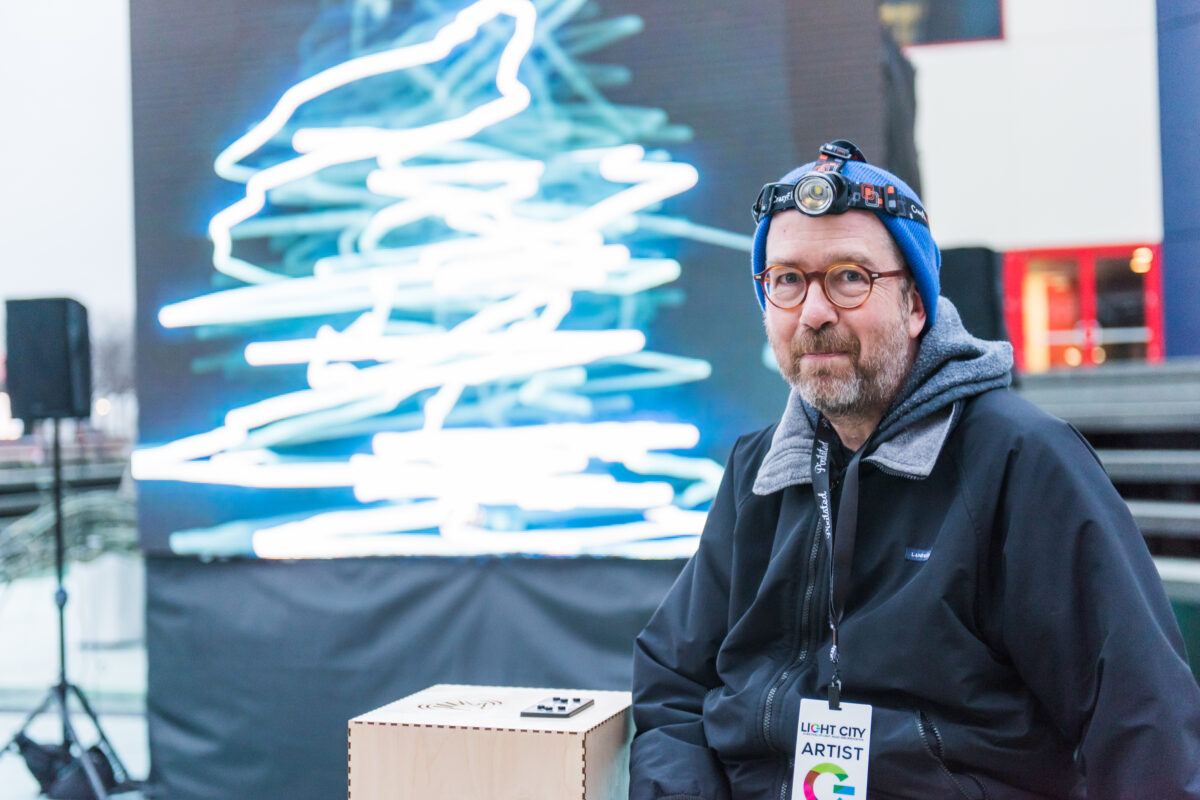
For the past year, UMBC’s Timothy Nohe, professor of visual arts, has served as a Fellow of the American Council on Education (ACE), the preeminent national program for cultivating leaders in higher education.
Since its inception in 1965, the ACE Fellows Program has strengthened institutions in American higher education by identifying and preparing more than 2,000 faculty, staff, and administrators for senior positions in college and university leadership through its distinctive and intensive nominator-driven, cohort-based mentorship model. More than 80 percent of past Fellows have gone on to serve as chief executive officers, chief academic officers, other cabinet-level positions, or deans following their fellowship.
The program combines leadership retreats, interactive learning opportunities, visits to campuses and other higher education-related organizations, and an extended placement at another higher education institution. This combination of elements works to condense what would otherwise be years of on-the-job experience and skills development into a single year.
Already a campus leader
Nohe was recognized as a campus leader even before his ACE Fellowship, having served as president of the faculty senate and as founding director of the Center for Innovation, Research and Creativity in the Arts (CIRCA).
“Long a leader in shared governance and arts research, Tim Nohe is admired across UMBC for his accomplishments and particularly for his values,” says Provost Philip Rous. “He has extended UMBC’s tradition of strong faculty leaders participating in this prestigious national program. And as a practicing artist, he has brought an important, distinctive perspective to his ACE fellowship cohort.”
Residency at Franklin & Marshall
Nohe was one of only thirty-eight ACE Fellows selected from across the nation in 2020, through a rigorous nomination and review process.
Because of the pandemic, his entire fellowship cohort was delayed by one year, but he used that time to expand his understanding of issues in higher education. When the program relaunched for 2021–22, ACE matched Nohe with Franklin & Marshall College in Lancaster, Pennsylvania as the site for his fellowship experience.
During the placement, Fellows observe and work with the host institution’s president and other senior officers, attend decision-making meetings, and focus on issues of interest. Fellows also conduct projects of pressing concern for their home institution, with the goal of implementing their findings when they return after their fellowship year.
Nohe explored issues around faculty governance, internationalization, diversity, equity and inclusion, and leadership while at Franklin & Marshall. He appreciates the combination of autonomy and open door access to senior leaders and faculty that he experienced there.
 Timothy Nohe poses with interactive artwork he developed for the 2017 Light City festival. (Marlayna Demond ’11/UMBC)
Timothy Nohe poses with interactive artwork he developed for the 2017 Light City festival. (Marlayna Demond ’11/UMBC)
“At Franklin & Marshall, I’ve gained perspectives on enabling students to secure their futures, exploring topics from wellness to maintaining college access and affordability,” he notes. “As Fellows, we learn to see the broad national landscape.”
At the same time, Nohe was able to share experiences and insight, developed over years at UMBC, with campus leaders and Franklin & Marshall.
Returning to UMBC with new-found insight
At the conclusion of the fellowship year, ACE Fellows return to their home institutions with new knowledge and skills. They also join a robust network of peers across the country and abroad—current and emerging higher ed leaders who are committed to tackling challenges in the field.
In pursuing this fellowship, Nohe says, “It was important to me to obtain a broader overview that would make me a stronger leader on campus.” He had already begun to see “a broader picture of higher ed” through founding and leading CIRCA at UMBC. But, he says, “I wanted to position myself to foster higher education in a very challenging time.” The ACE Fellowship gave him the broader perspective he was seeking.
Nohe cites his background in the arts as an important facet of his ACE Fellowship experience. “Artists have superpowers to reach across disciplines, and I’ve been really grateful as a past director of CIRCA to see that happen—how much synergy is developed,” he says. “In my work as an ACE Fellow, I’ve seen higher education leaders taking an interest in breaking down academic silos.”
“UMBC cares about the broader good of higher education,” Nohe shares, “and clearly Franklin & Marshall believes in it as well.” Now, he looks forward to returning to the UMBC community with new skills that can help lead the university on its path forward.





